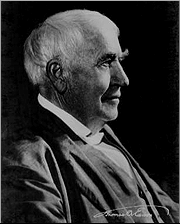
Thomas Edison
American Inventor
1847 -1931
Thomas Alva Edison was born on February
11, 1847 in Milan, Ohio. With only
three months of formal education
he became one of the greatest inventors and industrial
leaders in history. Edison obtained
1,093 United States patents, the most issued to any individual.
Edison's greatest contribution was
the first practical electric lighting. He not only invented the first
successful electric light bulb,
but also set up the first electrical power distribution company. Edison
invented the phonograph, and made
improvements to the telegraph, telephone and motion picture
technology. He also founded the
first modern research laboratory.
Edison was also a good businessman.
He not only designed important new devices, he created
companies worldwide for the manufacture
and sale of his inventions. Along with other manufacturing
pioneers of his era, Edison helped
make the United States a world industrial power. He and Henry
Ford became friends after Edison
encouraged Ford to use the gasoline powered engine for the automobile.
Edison was also a ruthless businessman
who fought viciously to defeat his competitors. One
of the most notorious examples
of his competitive vigor were the lengths he went to to discredit
Nicola Tesla's Alternating Current
system, which is the system of electrical distribution in use today.
Edison had great faith in progress
and industry, and valued long, hard work. He used to say,
"Genius was 1 percent inspiration
and 99 percent perspiration." Edison believed that inventing
useful products offered everyone
the opportunity for fame and fortune while benefiting society.